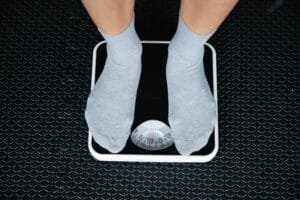Last Updated on December 6, 2025 by shawnshealth
Why is it so hard to lose weight? Discover the hidden reasons behind your struggle and get expert-backed tips to finally achieve lasting weight loss.
Why Is It So Hard to Lose Weight?
Yes. Why is it so hard to lose weight? Losing weight can feel like an uphill battle—one filled with confusing advice, stalled progress, and frustrating setbacks. Despite your best efforts, the scale may barely budge, leaving you wondering what you’re doing wrong. The truth is, weight loss is influenced by far more than just diet and exercise. Hormones, stress, sleep, and even your mindset play powerful roles. In this article, we’ll break down the most common challenges that make weight loss so difficult and, more importantly, explore real-world solutions to help you finally make lasting progress.
➡️ Want the complete breakdown? Read our Ultimate Weight Loss & Fat Loss Guide.
My Personal Struggles
Yes, it’s true. I have struggled with successful weight loss in the past and have observed many of my family’s heartbreaking attempts to lose weight permanently. Thankfully, my hobby and my knowledge have lent themselves to being successful (often while using my own body as a guinea pig). Yet, losing weight, and possibly even more challenging, keeping it off, isn’t easy. It takes planning, and some work to be successful. My readers will probably get tired of hearing me say this but, weight loss isn’t easy so make it as easy as possible.
IMO: Diet sodas, for example. I think we all know they can’t be good for you. Absolutely not! However, being overweight is such a serious issue that doctors are willing to open you up and do surgery on your internal organs in order to deal with being overweight/obese. So, if diet sodas help alleviate the cravings for sweet things, then why not? In other words, do what works as long as it’s not going to be worse than being overweight/obese.
Another example: I believe that the more natural we can eat the better. However, I have consumed a lot of protein powders in my lifetime because they were quick, packed with protein, and worked great to get my protein numbers up while decreasing overall calories. Is protein powder better than meat or other forms of protein? Nope. Yet, it’s convenient and makes getting protein easy. So, it’s a tool that is available and believe me, I put those tools to use.
Check out my article, fit it to your life so you can tweak it for you. Remember…
weight loss is not easy so make it as easy as possible!
Why Is Losing Weight So Difficult?
- Hormonal imbalances can increase hunger and fat storage
- Stress and lack of sleep disrupt metabolism
- Ultra-processed foods are high in calories and addictive
- Inconsistent habits reduce progress
- Genetics play a role in how your body stores fat
What Slows Down Weight Loss Even with Exercise?
- Overeating after workouts
- Not enough protein to preserve muscle
- Doing only cardio without strength training
- Underestimating calorie intake
- Medical issues like thyroid imbalances
How Does Stress Affect Weight Loss?
- Raises cortisol, increasing belly fat
- Triggers cravings for sugar and carbs
- Disrupts sleep, slowing metabolism
- Reduces motivation to stay active
- Increases emotional eating patterns
What Are the Most Common Weight Loss Mistakes?
- Skipping meals or extreme dieting
- Drinking hidden calories (soda, alcohol)
- Not tracking food intake accurately
- Lack of sleep or recovery
- Ignoring strength training
🔥 Struggling to lose fat even with consistent workouts? Our post Why Is Weight Loss So Hard? breaks down the hidden challenges—like hormones, stress, and sleep—and shows how to overcome them for lasting results.
Check out this video from SciShow describing some of the difficulties we can have when trying to lose weight.
Table of Contents
As an Amazon Associate, I earn from qualifying purchases. This means I may receive a commission if you purchase through links on this site, at no extra cost to you.
Always consult your doctor before starting any new exercise program. The author is not responsible for injuries or health issues arising from the use of this information.

The Hidden Challenges Behind Weight Loss
Losing weight isn’t just about eating less and moving more—there are deeper biological, psychological, and environmental factors at play. Here’s why dropping pounds can feel like an uphill battle:
1. Your Body Fights Weight Loss
When you cut calories, your body activates survival mechanisms to preserve fat stores. This is due to a process called adaptive thermogenesis, where your metabolism slows down in response to weight loss. Essentially, your body fights back, making it harder to sustain progress.
Solution: Focus on gradual, sustainable calorie reduction and prioritize protein intake to maintain muscle mass, which helps keep metabolism steady.
2. Hunger Hormones Work Against You
Your body produces hormones like ghrelin (which increases hunger) and leptin (which signals fullness). When you lose weight, ghrelin levels rise, making you hungrier, while leptin drops, making you feel less satisfied after eating.
Solution: Eating high-fiber foods, protein-rich meals, and healthy fats can help control hunger. Aim for foods like avocados, nuts, lean meats, and legumes to keep cravings in check.
3. Emotional Eating and Stress
Stress, anxiety, and emotional triggers often lead to overeating, especially comfort foods high in sugar and fat. This isn’t just a lack of willpower—stress hormones like cortisol actually drive cravings for high-calorie foods.
Solution: Practice mindful eating, reduce stress with exercise, meditation, or deep breathing, and replace emotional eating habits with healthier coping mechanisms like journaling or a quick walk.
4. Sleep Deprivation Disrupts Weight Loss
Lack of sleep messes with your hormones, increasing cravings and reducing your body’s ability to burn fat effectively. Studies show that sleep-deprived individuals eat more calories and are more likely to gain weight.
Solution: Prioritize 7-9 hours of quality sleep per night, create a relaxing bedtime routine, and avoid screen time before bed.

5. Your Metabolism Slows with Age
As you get older, muscle mass declines, and metabolism naturally slows. This means that even if your diet and exercise habits stay the same, weight gain can creep up over time.
Solution: Strength training helps preserve muscle mass and keeps your metabolism active. Aim for resistance exercises at least 2-3 times per week.
💪 Discover how to build impressive strength using just your body! Dive into our Calisthenics Strength Guide for proven techniques that develop power, control, and endurance—no gym required.
6. Ultra-Processed Foods Sabotage Results
Highly processed foods are engineered to be addictive, making it difficult to stop at just one serving. These foods are often calorie-dense but nutrient-poor, leading to overeating and weight gain.
Solution: Stick to whole, minimally processed foods like vegetables, lean proteins, healthy fats, and complex carbs.

Breaking Through: How to Overcome These Challenges
1. Follow a Realistic Eating Plan
Fad diets often lead to failure. Instead, adopt a flexible, balanced diet that includes all food groups in moderation.
2. Stay Active in Ways You Enjoy
Find activities you love—whether it’s walking, dancing, swimming, or lifting weights. Consistency is key!
3. Track Your Progress (Without Obsessing)
Use tools like food journals, progress photos, or body measurements instead of just relying on the scale.
4. Build a Support System
Accountability helps! Join a fitness community, find a workout buddy, or seek professional guidance if needed.
🧠 Want to boost your chances of long-term weight loss success? This Mayo Clinic article explains why social support is a powerful—and often overlooked—tool for staying motivated and accountable.

Conclusion: Sustainable Weight Loss Is Possible
Losing weight is challenging but not impossible. By understanding why, it is so hard to lose weight, you can take steps to overcome the obstacles and create a sustainable, enjoyable path to success. Small, consistent changes lead to lasting results—so start where you are and keep moving forward!
🧘♀️ Before you head out, take a moment to explore How Does Working Out Reduce Stress?—a quick dive into how movement boosts mood, lowers cortisol, and builds mental resilience.
🔥 Gear to Help You Achieve Your Health and Fitness Goals 💪
If you’re looking for tools to enhance your fitness journey, check out this. Explore top-rated fitness gear on Amazon to enhance your workouts. Check out the latest picks here! 🛒 to support your workouts and progress.
🚀 Find equipment designed to boost strength, endurance, and overall performance!
⚠️ Short disclaimer: As an Amazon Associate, I earn from qualifying purchases.
People Also Ask
Why is it so hard to lose weight as you get older?
- Metabolism slows with age
- Muscle mass decreases naturally
- Hormonal shifts impact fat storage
- Activity levels often decline
- Sleep quality worsens, affecting appetite
- Stress increases over time
Can stress stop you from losing weight?
- Raises cortisol, promoting belly fat
- Triggers emotional eating
- Reduces sleep quality and recovery
- Increases cravings for sugar and carbs
Why am I not losing weight even in a calorie deficit?
- Calorie tracking may be inaccurate
- Water retention can mask fat loss
- Metabolic adaptation may occur
- Hormonal imbalances like thyroid issues
- Muscle gain may offset fat loss
How does sleep affect weight loss?
- Poor sleep increases hunger hormones
- Reduces willpower and decision-making
- Slows metabolism and recovery
- Leads to cravings for high-calorie foods
Why doesn’t exercise alone lead to weight loss?
- Exercise burns fewer calories than expected
- Often leads to increased appetite
- Doesn’t address poor diet habits
- Weight loss requires a calorie deficit
What medical conditions make weight loss harder?
- Hypothyroidism slows metabolism
- PCOS affects insulin and fat storage
- Depression can reduce motivation
- Insulin resistance promotes fat gain
- Medications may cause weight gain
May the God of hope fill you with all joy and peace as you trust in Him, so that you may overflow with hope by the power of the Holy Spirit. – Romans 15:13




